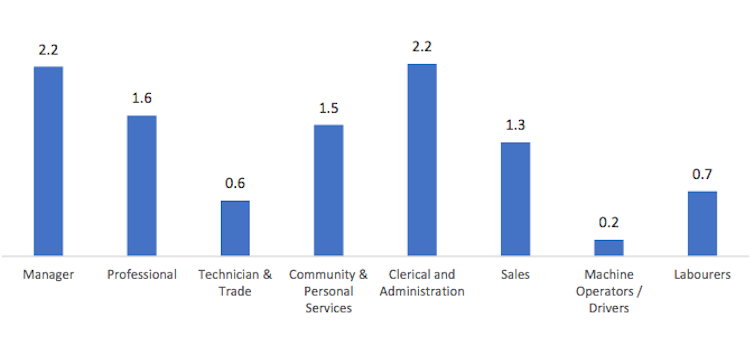Why Doesnt Dont as Again Work
The corking enforced global experiment in working from dwelling is coming to an end, as vaccines, the Omicron variant and new therapeutic drugs bring the COVID-nineteen crunch nether control.
But a voluntary experiment has begun, as organisations navigate the new landscape of hybrid piece of work, combining the all-time elements of remote work with time in the office.
Yes, at that place is some push for a "return to normal" and getting workers back into offices. But ideas such as food vouchers and parking discounts are more often than not being proposed past city councils and CBD businesses groovy to get their former customers back.
A wide range of surveys over the past xviii months show most employees and increasingly employers have no desire to return to commuting five days a week.
The seismic shift in employer attitudes is signalled by Google, long a fierce opponent of working from home.
Last calendar week the company told employees they must return to the office from early Apr – only only for three days a week.
That'due south still way more than tech companies such as Australia'southward Atlassian, which expects workers to come into the office just four days a year, merely information technology is a far cry from its pre-pandemic resistance to remote work.
Hybrid work is here to stay. Employers will either encompass the change or find themselves being left behind.
Gains in productivity
Google began – under pressure – to soften its opposition to remote work in 2020. In December of that year chief executive Sundar Pichai told employees:
We are testing a hypothesis that a flexible work model will lead to greater productivity, collaboration, and well-being.

Its chief business organization has been protecting the social upper-case letter that springs from concrete proximity – and also perhaps with keeping employers under surveillance.
Merely longstanding (and widespread) management concerns that employees working from home would lower productivity accept proven unfounded.
Baca juga: 50 years of assuming predictions about remote work: it isn't all nigh technology
Even before the pandemic there was good enquiry showing no productivity penalization from remote working – the opposite, in fact.
For example, a 2014 randomised trial involving about 250 Shanghai phone call middle workers found working from home associated with 13% more productivity. This comprised a 9% gain from working more minutes per shift – due mayhap to fewer interruptions – and a iv% gain from making more calls per minute – attributed to a quieter, more comfy working surroundings.
Enquiry in the past two years supports these findings.
Harvard Business organisation School professor Raj Choudury and colleagues published research in October 2020 that found assuasive employees to work wherever they like led to a 4.4% increase in output.
In Apr 2021, Stanford University economist Nick Blossom and colleagues calculated a the shift to remote working resulted in a 5% productivity heave. Though their working paper, published past the National Bureau of Economic Enquiry, was not peer reviewed, information technology was based on surveying 30,000 American workers, which is a decent sample size.
Our relationship with work has changed
There are good reasons almost of u.s.a. don't want to go back to the old normal. Information technology simply wasn't that great.
While working from home tin bring challenges of other kinds, non least the power to switch off and stop working when work is done, working in an office can increase stress, lower mood and reduce productivity.
My ain research has measured the effects of typical open-plan function noises, finding a 25% increase in negative mood even after a short exposure fourth dimension.
And then in that location's the fourth dimension spent commuting. Not having to go into the office every twenty-four hour period frees upward hours of time to exercise other things. Particularly in winter it'south nice to non accept to leave and arrive habitation in the nighttime.
Preferred number of days working at home, by occupation

Changed expectations of work
The importance of these things should not be underestimated.
In a June 2021 study by McKinsey of 245 employees who had returned to the role, one-3rd said they felt their mental wellness had been harmed.
The feel of the pandemic has lowered our tolerance for this one-time world of piece of work.
Nothing exemplifies this better than the growth of the "lie-flat" trend, which began in Red china and is at present a global phenomenon. Increasing numbers of people are rejecting the idea of pursuing a career at all costs.
They don't desire to spend their life existence a cog in the bike of commercialism and are choosing to work less – even not at all.
No one size fits all
Rather than a bastion of meaning and fulfilment, the structures around how we have conducted work has for many people meant an existence of quiet agony. The pandemic has brought an unforeseen opportunity to alter this narrative and rethink both the mode we work and the part of work in our lives
For some, no job is amend than a bad job. The rest of united states will settle for the flexibility we've had over the past 2 years.
Baca juga: How many days a week in the office are enough? You shouldn't need to inquire
No one size fits all. The downsides of working from abode include missing coworkers and losing the benefits of serendipitous conversations. The nuances of how much time we need to spend together in the office for outcomes like creativity, belonging, learning and relationship building varies between individuals, teams and job types.
But what is certain is we don't need to be together v days a week to brand these things happen. With a shrinking workforce and an increasing war for talent, employers who don't provide flexibility will be the losers.
Source: https://theconversation.com/even-google-agrees-theres-no-going-back-to-the-old-office-life-177808
0 Response to "Why Doesnt Dont as Again Work"
Post a Comment